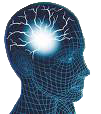What’s in a name ?
by admin
Many people have heard of ‘Tension-type’ headaches (TTH), and lots of headpain sufferers will have been given this diagnosis. The name would suggest the headaches are either due to physical ‘tension’(for example in the muscles of the neck), or psychological ‘tension’ (stress/anxiety). However research in the past has shown little correlation between TTH & muscle tenderness/tightness &/or anxiety/depression.
Frequently the diagnosis/label is used as a ‘catch all’, based on whether;
1) the headpain has certain characteristics’
2) that other types of headpain have been excluded.
Thus TTH is a relatively non-specific diagnosis & the actual cause may be hard to ascertain.
I was therefore interested in the following article published in Medscape;
A new study shows that patients with tension-type headache (TTH) have relatively weak neck extension muscles ( these are the muscles that bend your neck backwards & also contribute to keeping the head upright).
Researchers found that these patients are 26% weaker than controls with respect to neck extension muscles, that they have a 12% smaller extension/flexion ratio, and that they have a borderline significant difference in the ability to generate muscle force over the shoulder joint.
“We found that patients with tension-type headache exhibited decreased muscle strength in the neck extensor muscles, which caused this reduced ratio between extension and flexion,” said lead study author Bjarne Madsen, a physiotherapist and PhD student in the Department of Sports Science and Clinical Biomechanics, University of Southern Denmark and Danish Headache Center Glostrup Hospital.
With this reduced ratio, the muscles in the front of the neck pull the head forward, which causes continuous muscular activity in the neck, explained Madsen. “This can lead to pain and, over time, it can cause tension-type headache.”
This lower ratio “indicates that a higher relative loading of the neck extensor muscles could be present in everyday activities,” write the authors. “This possibly contributes to additional tension in the extensor muscles as well as disturbed stabilization in the neck and coordination of head movements.”
A reduced extension/flexion ratio may contribute to TTH onset and eventually to the development of chronic TTH, said the authors
Comments;
As mentioned at the beginning of this post TTH is poorly understood & is often used as a bit of an ‘umbrella’ type label, covering a variety of headpain types which may be subtly different & have different causes (including among others muscle tension, psychological factors etc.). In my opinion with some cases it may even be a mild ‘version’ of migraine-type headpain.
So once again a detailed history & examination is important to establish the best approach regarding management + treatment of TTH, and yes, this may include exercises to strengthen the neck muscles !
Comments
Leave a Reply

